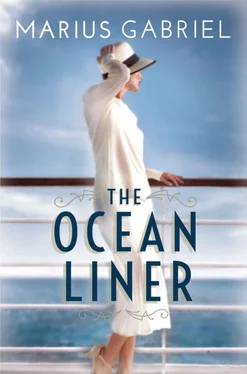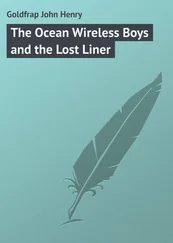The light was failing fast. Even Mad King Ludwig had acknowledged it and was buttoning up his shirt. An immense darkness had started to spread across the sky. But the many vigilant pairs of eyes on the conning tower had caught something in the last gleams and there were excited shouts.
Todt saw it too through the high-powered bridge binoculars, a smudge on the distant horizon, glimpsed from the top of a swell before U-113 slid down into the trough again. He yielded the binoculars to his First Watch Officer. ‘What do you see, Hufnagel?’
Hufnagel peered through the Zeiss lenses as U-113 rose again. ‘Smoke,’ he said. ‘Bearing fifteen degrees to our east.’
‘A convoy?’
‘A single vessel, in my opinion.’
‘Good.’ Todt turned to his crew, his pale eyes alight. ‘Everyone below.’
Up on the bridge, the captain of the Manhattan , Commodore Albert Randall, was thinking about the Athenia, a thirteen-thousand-tonner of the White Star Line, built in Glasgow, with all the latest navigation equipment, torpedoed at night in the Western Approaches on the first day of the war.
He, who had himself been torpedoed by a German submarine in the last war, and had barely escaped with his life, could imagine the scene all too well. The screams of terror, the surge of water into the engine room, the inevitable slide into the depths. And then the chaos in the lifeboats, some sucked into the Athenia ’s own churning propellers, others capsizing in the heavy seas. Passengers crushed against the hull, drowned in the icy water, freezing to death in their flimsy nightgowns. The brave crew sacrificing their own lives for those who’d bought hundred-dollar tickets.
It was, if nothing else, an indication of how this war was going to go. No quarter asked or given.
A large, bluff man with a determined chin, Commodore Randall had seen his share of maritime disasters and had played a gallant role in many of them. He’d saved the 274 passengers of the Powhatan in 1920. Then there had been the schooner Reine de Mers in 1922, foundering amid mountainous seas off Newfoundland; and the Coast Guard cutter blown out to sea in a gale in 1924 off Nantucket. The crews of both those vessels owed their lives to him. And there had been a dozen rescues since.
As a result of these actions, he had been given the soubriquet ‘Rescue’ Randall. He was proud of the fact that his name was known to thousands and was seldom mentioned in the press without the word heroic attached to it. Though cultivating a reputation for modesty, he relished his fame and he knew how to capitalise on it. He liked being – like Manhattan herself – an emblem of American derring-do and enterprise in a world which he felt was sliding into darkness.
However, he didn’t want any dramatics on this trip. Especially not since it was his last crossing, with a well-earned retirement at the end of it. And especially not with the distinguished passenger list he would be carrying. He had been applying his mind to avoiding the fate of the Athenia . There would be an unmistakable message to port and starboard. He stood at the window, solid as a polar bear, and looked down with satisfaction at the hoardings which had been erected on either side of the Manhattan ’s hull.
Arturo Toscanini stood on the quayside, leaning on his cane among the bustle of stevedores and longshoremen, looking up at the great bulk of the Manhattan , which towered above him like a cliff face. She was the largest ship ever built in the United States, over seven hundred feet long. On each side was a hoarding painted with American flags and the legend:
MANHATTAN
UNITED STATES LINES
The idea, Toscanini presumed, was that this message, visible across miles of ocean, would deter German submarines from torpedoing the ship, as they had done with the unfortunate Athenia . He was not so certain that any such compunction would hinder the Nazis. Thinking back over his long and bruising battle with Mussolini, much of it fought in the sacred precincts of La Scala, he could not recall a single occasion when mercy had been shown – or conscience, or compassion, or generosity of spirit.
His dearest friends had been driven into exile, had thrown themselves out of windows, had endured arrest and torture. He himself had been beaten in the street by Mussolini’s thugs. He had seen his country sink into a welter of brutality and bombast. Longing for Italy as he was, he could no longer go home without risking his life.
It would be ironic if he were to meet his fate at the hands of a U-boat crew. In May of 1915, he had been booked on the Lusitania , but had cut short his schedule at the Met and chugged home early on an old Italian steamer. He’d arrived in Italy to hear that the swift and glittering Lusitania had been sunk by a German submarine, with the loss of twelve hundred lives. Someone else had died in his cabin.
‘Good morning, maestro!’
A dapper man, he tipped his fedora to the group of excited women who had recognised him. Doing so revealed that although the famous, curled-up moustaches were still dark, his hair was now white and sparse. He was used to being recognised. His portrait had been put up in every shop window. He had been hailed as the age’s greatest conductor. Complete strangers greeted him, though sometimes (overexcitedly) as ‘Mr Wagner’ or ‘Mr Beethoven.’
Toscanini pulled his fob watch out of his waistcoat pocket and consulted it. It was past noon. He hurried up the gangplank, back on to the Manhattan , where he made his way to the ship’s radio telegraph office. It was crowded with passengers frantic for news of wives, husbands, children, lovers. The postmaster spotted Toscanini’s diminutive figure behind the wall of customers at the counter. He waved the conductor over and leaned down to murmur through the gap under the glass window.
‘Very sorry, Mr Toscanini. There’s nothing for you today.’
‘Sure?’
‘Quite sure.’
‘Thank you.’ Toscanini tipped his hat, hiding his dismay. He felt faint as he pushed his way out through the throng. Where was she? Why had she not sent word?
Outside the telegraph office he pulled out his handkerchief and mopped his brow. He ached for Carla’s steadying hand on his arm.
Communications with Lucerne were wretched now. They had stayed far too long in Kastanienbaum, lulled by the autumn beauty of the lake, shutting their ears to the rumble of mobilising and approaching conflict. War had surprised them.
He’d rushed on ahead to secure their passage on the Manhattan ; Carla was due to have followed, but days had passed and he had heard nothing from her. He did not even know if she had left Switzerland. For all he knew, she was still in Kastanienbaum, closer to Munich than to Paris.
Ancient creatures they were now, he and Carla, married forty-two years. Like two old trees, bent by storms and beaten by suns, that leaned on one another for support. She had told him to leave without her if she did not make it to Le Havre. But he could not leave France without her. If Carla did not arrive in time, he would renounce their cabin and wait for her. And who knew when the next passenger ship would sail for America? Perhaps Manhattan was the last.
He stared out across the harbour. Le Havre was a gracious city, extending around the bay in pleasant sunshine. What would be left of it when the Germans had done with it, he wondered? Short-sighted as he was, he could see that the port was busy, crowded with ships of all sizes, loading and unloading, the black hulls streaked with rust. The banks of cranes swung to and fro against the pale blue sky. There was a frenetic haste to everything these days, a scramble, a stampede.
Читать дальше













